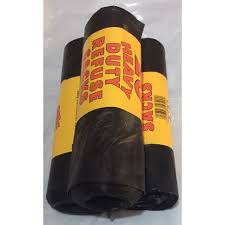Waste (Trash) Bag Production In Nigeria; (From Secondary Recycled Material); The Feasibility Report

Proper management of solid waste is critical to the health and well-being of urban residents. In Lagos metropolis, like most cities in the developing world, several tons of municipal solid waste is left uncollected on the streets each day, clogging drains, creating feeding ground for pests that spread disease and creating a myriad of related health and infrastructural problems.
A substantial part of the urban residents in the city and suburban informal settlements of Lagos metropolis also have little or no access to solid waste collection services. This is due to lack of proper land use planning which resulted in the creation of informal settlements with narrow streets that make it difficult for collection trucks to reach many areas.
The result is that a large portion of the population is left without access to solid waste management making them particularly vulnerable.
Presently, the rate of waste generation in Lagos (with estimated population over 10 million in 2012) is 9, 000 tonnes/day (Lagos State Waste Management Authority, LAWMA) while in Kano State, the rate is 3, 849 tonnes/day (Bayero University Kano Consultancy Unit).
Generally, the average rate of generation is estimated as 0.5kg/capital/day. Biodegradable waste account for over 50% of waste generated with other component estimated at different composition in different States.
Waste bag is needed to properly handle these wastes. Waste bag can be produced from HDPE, LDPE or recycled material.
Plastic recycling is the process of recovering scrap or waste plastic and reprocessing the material into useful products, sometimes completely different in form from their original state. Recycled material can either be primary, those gotten during production or secondary, those collect after use.
To reduce cost, the plant would make use of secondary recycled material.
This feasibility report seeks to examine the financial viability or otherwise of establishing waste bag production plant in Nigeria from 100% secondary recycled material.
The proposed plant comprise of one set film blowing machine of 35 kg / hr capacity and two sets of Ribbon-through continuous-rolled bag making machine producing 150 pcs / min. The equipment would operate at 90% of the installed capacity working double shifts of 8 hours each in 300 day per annum.
The plant would produce 176,223 pcs per day of 450 mm * 550 mm waste bag of 0.015mm thickness each requiring 504 kg of raw materials. The product would be packaged in rolls of 30 sheets each and 30 pieces of such rolls would fill a carton.
Other equipment’s are auto load, air compressor, die rotary device and Double side’s winder.
Custom Research Request
Still haven't found what you're looking for?
Speak to our Custom Research Team.
Table of Contents
EXECUTIVE SUMMARY Business Overview 1.1 Description of the Business 1.2 Vision and Mission Statement 1.3 Business Objective 1.4 Value Proposition 1.5 Critical Success Factor of the Business 1.6 Current Status of Business 1.7 Description of the Business Industry 1.8 Contribution to Local and National Economy Marketing Plan 2.1 Description of product 2.2 Product Packaging and delivery 2.3 The Opportunity 2.4 Pricing Strategy 2.5 Target Market 2.6 Distribution and Delivery Strategy 2.7 Promotional Strategy 2.8 Competition Production Plan 3.1 Description of the Location 3.2 Raw Materials 3.3 Production Equipment 3.4 Production Process 3.5 Production Cost 3.6 Stock Control Process 3.7 Pre-Operating activities and expenses 3.7.1 Operating Activities and Expenses 3.8 Milestones Organizational and Management Plan 4.1 Ownership of the business 4.2 Profile of the promoters 4.3 Key Management Staff 4.3.2 Management Support Units 4.4 Details of salary schedule Financial Plan 5.1 Financial Assumption 5.2 Start up Capital Estimation 5.3 Source of Capital 5.4 Security of Loan 5.5 Loan Repayment Plan 5.6 Profit and Loss Analysis 5.7 Cashflow Analysis 5.8 Viability Analysis Business Risk and mitigation factor 6.1 Business Risks 6.2 SWOT Analysis
Project Specification:
Additional Info
Get this Report
Direct bank transfer
To order the report, Please do pay the sum of ₦50,000 into
Account Name : Foraminifera Market Research Ltd
Account Number : 274 20 569 37
Account Name : Foraminifera Market Research Ltd
Account Number : 101 76 603 95
Account Name : Foraminifera Ventures
Account Number : 011 66 066 32
Make your payment directly into our bank account. Please use your Order ID as the payment reference. Your order will not be shipped until the funds have cleared in our account.
Instructions
After payment call us on 01 -29 52 413 / 08033782777 or email us at foraminiferamarketresearch@yahoo.com with the payment details. After payment confirmation, the soft copy of the report would be sent to you within 24 hours.
